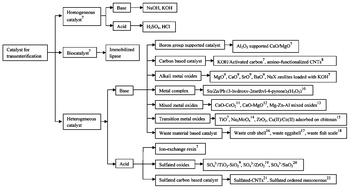Evolution towards the utilisation of functionalised carbon nanotubes as a new generation catalyst support in biodiesel production: an overview
Abstract
The conventional heterogeneous catalysts involved in biodiesel production include mixed metal oxides, alkaline metal oxides, ion-exchange resins, sulfated oxides and immobilised enzymes. Heterogeneous catalysis has emerged as the preferred alternative for biodiesel production because the products are easy to separate, the catalysts are reusable, and the process is environmentally friendly. However, this method suffers from limitations, such as mass transfer problems, high cost and low catalyst stability, that diminish its economic feasibility and low environmental impact on the entire biodiesel process. Carbon nanotubes (CNTs) appear to be a promising catalyst support for biodiesel production due to their ability to overcome the limitations faced by conventional heterogeneous catalysts. Thus, the aim of this paper is to present the current application of functionalised CNTs as catalyst support in biodiesel production, discussing issues such as the limitations encountered by conventional heterogeneous catalysts, the advantages offered by functionalised CNTs and possible methods to functionalise CNTs to serve as catalyst support in biodiesel production. In addition, the reaction parameters required for the transesterification/esterification reaction using functionalised CNTs will be discussed, including the catalyst's life time and regeneration. The challenges and future outlook on the use of functionalised CNTs in the biodiesel industry are also presented. Based on the findings presented in this review, functionalised CNTs have the potential to be a breakthrough technology in the biodiesel industry.


 Please wait while we load your content...
Please wait while we load your content...